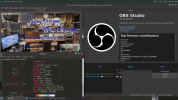It does sound like you have a design in mind but you expect others to do the work for you. I would recommend you consider contributing your ideas to the GhostBSD efforts if possible. They do have a default desktop and a live system as well. You may have some input that could be valuable in their operating system.
I'm not asking anyone to do anything. I'm simply stating the current status quo (and outcomes that many seem to be complaining about) and what could be done to improve the issue with that. FreeBSD lacks drivers.. and applications. Yes, I know.. catch 22. But something needs to be done. You could probably guess what my suggestion would be to alleviate that.** I got burnt by FreeBSD and went back to macOS.. with all other benefits involved (apps, ecosystem, hardware, iOS)... I see don't reason to go back. I'm sure a lot of committers would agree.. just look at the all of the attendees at annual BSD conferences.. mostly Macs. There's not enough dogfooding.. but, that's not my problem either. macOS is BSD Unix on the desktop; that's very good convenience to give up. However, FreeBSD with solid gnome2 (as a UX) would be something nice and different IMO.
**Hint: Ubuntu solved this issue years ago.. something Redhat themselves even ignored around.. say, Ubuntu 8.04. (yes, I used Linux previously). And now the Linux community are getting first party releases from companies like Presonus and Valve.
As you say, people need to get sh*t done - but: why should I care?
Lol.. so that's your angle.. self-centeredness. ok. sure.
What you care for or not is up to you; that's not my prerogative. However, there are many environments where FreeBSD would fit the bill. FreeBSD could be a great low cost alternative to commercial desktops for environments that don't require typical commercial apps. For example, FreeBSD could easily replace macOS (potentially) or Scientific Linux for academia or other related stuff; but scientists are not going to waste time mucking with a shell. ZFS would a be huge boom for science/HPC stuff.


